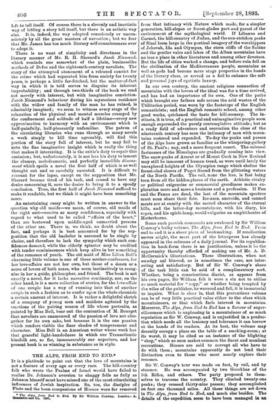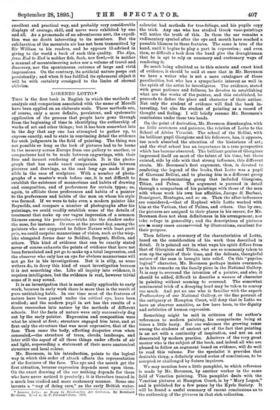THE ALPS, FROM END TO END.* IT is a platitude
to point out that the love of mountains is not a feature of every age or every race. The hill-country folk who wrote the Psalms of Israel would have failed to realise Dr. Johnson's aversion to shaggy fells as fully as Johnson himself must have missed one of the most stimulating influences of Jewish inspiration. So, too, the disciples of Plato and the boon companions of Horace were far removed
• The Alpe, from End to End. By Sir William Conway. London: A. Qom:table and Co. 1895,
from that intimacy with Nature which made, for a simpler generation, hill-slopes or forest.glades part and parcel of the environment of the mythological world. If Libanus and Carmel, the hill-country of Judaea, and the sun-stricken peaks of Sinai loom large in the poetical imagery of the worshippers of Jehovah, Ida and Olympus, the stern cliffs of the Sabine and the gentler vales and lakes of the Alban mountains have no less a place in other literatures and among other devotees. But the life of cities worked a change, and before ruin fell on the civilisation of the Mediterranean people, mountains as well as gods had become mere stage properties in the hands of the literary class, or served as a foil to enhance the soft and personal jays of egotistic luxury.
In our own century, the ancient religious connection of mountains with the lovers of the ideal was for a time revived, and has had an importance of its own. One of the paths which brought our fathers safe across the arid wastes of the Utilitarian period, was worn by the footsteps of the English romanticists; and the English romantic school, among other good works, quickened the taste for hill-scenery. The in- stincts, it is true, of a practical and unimaginative people soon enough superseded the purely contemplative attitude; but as a ready field of adventure and recreation the close of the nineteenth century has seen the intimacy of men with moun- tains restored and expanded. To-day the peaks and passes of the Alps have grown as familiar as the whispering-gallery of St. Paul's ; nay, and a more frequent resort. The colossal fastnesses of the Himalayas are gradually coming into view. The snow-peaks of Ararat or of Mount Cook in New Zealand may still be innocent of human tread, as were until lately the unexplored heights of the Olympian range which shelter the forest-clad shores of Puget Sound from the glittering waters of the North Pacific. The veil, none the less, is fast being torn from all the hidden places of the earth. Athletic rivalry or political exigencies or commercial greediness makes ex- ploration more and more a business and a profession. If Pan and the Fauns are dead, the last of the mountain spectres must soon share their fate. Ice-axes, aneroids, and canned meats are at enmity with the sacred character of the eternal hills, and the latter-day mountaineer, with his diary, his ropes, and his spirit-lamp, would vulgarise an amphitheatre of Matterhorns.
Some such peevish comments are awakened by Sir William Conway's bulky volume, The Alps, from End to End. From end to end it is a sheer piece of bookmaking. If recollection serves aright, the most part of the letterpress has already appeared in the columns of a daily journal. For its republica- tion in book-form there is no justification, unless it be the opportunity thereby afforded of making use of Mr. A. D. McCormick's illustrations. These illustrations, when not smudgy and blurred, as is sometimes the case, are inter- esting and satisfactory. But of Sir W. Conway's share of the task little can be said of a complimentary sort. Whether, being a conscientious diarist, as appears from his own pages, Sir William felt it were a sin not to utilise so much material for " copy," or whether being tempted by the wiles of the publisher, he wavered and fell, it is immaterial to inquire. What is clear is, that this pretentious volume can be of very little practical value either to the class which mountaineers, or that which feels interest in mountains. Moreover, The Alps, from End to End has a flavour of super- ciliousness which is unpleasing in a mountaineer of so much reputation as Sir W. Conway, and is unjustified in a produc- tion which needs all the leniency and tolerance it can borrow at the hands of its readers. At its best, the volume may decently occupy a place on the table of a smoking-room; at its worst, it may be cited as an instance of the blighting " shop," which so soon makes common the finest and manliest recreations. Horses are said to corrupt all who have to do with them ; mountains apparently do not lend their distinction even to those who most nearly explore their recesses.
Sir W. Conway's tour was made on foot, by rail, and by steamer. He was accompanied by two Goorkhas of the 5th Rifles, and others. The party proposed to them- selves to traverse the country. They climbed twenty-one peaks ; they crossed thirty-nine passes; they accomplished on foot one thousand miles. All these things are set down in The Alps, from End to End, and much else besides. The details of the expedition seem to have been managed in an excellent and practical way, and probably very considerable displays of courage, skill, and nerve were exhibited by one and all. As a promenade of an adventurous sort, the expedi- tion was no doubt interesting to its members. But the exhilaration of the mountain air has not been transmitted by Sir William to his readers, and he appears ill-advised in giving to the world a book of such thin quality. The Alps, from End to End is neither fish, flesh, nor fowl,—it is neither a manual of mountaineering notes nor a volume of travel and discovery, nor the spontaneous outcome of large and vivid impressions. On the contrary, its artificial nature peeps out persistently ; and when it has fulfilled its ephemeral object it will be with certainty consigned to the limbo of eternal oblivion.







































 Previous page
Previous page